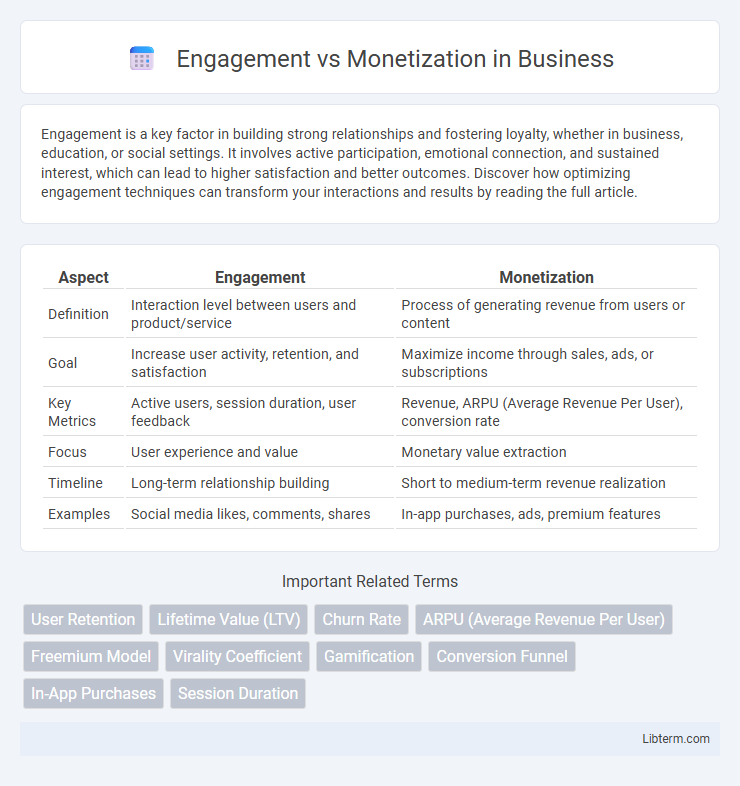Engagement is a key factor in building strong relationships and fostering loyalty, whether in business, education, or social settings. It involves active participation, emotional connection, and sustained interest, which can lead to higher satisfaction and better outcomes. Discover how optimizing engagement techniques can transform your interactions and results by reading the full article.
Table of Comparison
| Aspect | Engagement | Monetization |
|---|---|---|
| Definition | Interaction level between users and product/service | Process of generating revenue from users or content |
| Goal | Increase user activity, retention, and satisfaction | Maximize income through sales, ads, or subscriptions |
| Key Metrics | Active users, session duration, user feedback | Revenue, ARPU (Average Revenue Per User), conversion rate |
| Focus | User experience and value | Monetary value extraction |
| Timeline | Long-term relationship building | Short to medium-term revenue realization |
| Examples | Social media likes, comments, shares | In-app purchases, ads, premium features |
Understanding Engagement and Monetization
Understanding engagement involves analyzing user interactions such as session length, click-through rates, and content shares to gauge audience interest and loyalty. Monetization focuses on converting this engagement into revenue through strategies like in-app purchases, subscription models, advertising, and affiliate marketing. Balancing high engagement with effective monetization techniques is crucial for sustainable business growth in digital platforms.
Key Differences Between Engagement and Monetization
Engagement measures user interaction with content, reflecting metrics such as time spent, likes, shares, and comments, indicating audience interest and loyalty. Monetization focuses on converting that engagement into revenue through strategies like advertising, subscriptions, or in-app purchases. The key difference lies in engagement driving user activity and brand affinity, while monetization directly impacts financial performance by leveraging that activity.
Why Engagement Matters for Long-term Growth
High engagement boosts user retention by fostering a loyal community that consistently interacts with your product or service. Engaged users generate valuable feedback and organic promotion, fueling sustainable growth and improving monetization opportunities over time. Prioritizing engagement helps build trust and brand affinity, which are critical for long-term success and revenue stability.
Monetization Strategies: An Overview
Monetization strategies encompass diverse methods such as subscription models, in-app purchases, advertising, and affiliate marketing to generate revenue efficiently. Leveraging data analytics and user behavior insights enables businesses to tailor offers and optimize pricing for higher conversion rates. Effective monetization balances value delivery with user experience, ensuring sustained engagement while maximizing financial returns.
Balancing Engagement with Revenue Goals
Balancing engagement with revenue goals requires integrating user experience strategies that drive meaningful interactions without compromising monetization efforts. Prioritizing content personalization and seamless in-app purchases enhances user satisfaction while maximizing lifetime value. Data-driven insights enable optimization of engagement metrics alongside revenue streams, ensuring sustainable growth.
Common Engagement Metrics to Track
Common engagement metrics to track include active user count, session duration, and interaction rate, which reveal how frequently and deeply users interact with a product. Monitoring click-through rates, shares, and comments provides insight into user interest and content relevance. These metrics help identify patterns that inform strategies to enhance user experience and drive monetization opportunities.
Effective Monetization Models Explained
Effective monetization models leverage user engagement metrics to maximize revenue streams by aligning content value with audience preferences. Subscription services, in-app purchases, and targeted advertising exemplify strategies that convert high engagement into sustainable income while maintaining user satisfaction. Data-driven personalization enhances these models by optimizing user experience and increasing conversion rates.
How Engagement Drives Monetization Success
Higher user engagement significantly boosts monetization success by increasing time spent on platforms, which leads to more ad impressions and higher conversion rates. Engaged users are more likely to interact with premium content, subscribe to services, and make in-app purchases, directly enhancing revenue streams. Data from multiple studies show that platforms with strong engagement metrics often report up to 40% greater monetization efficiency compared to less engaged audiences.
Challenges in Combining Engagement and Monetization
Balancing engagement and monetization presents significant challenges, as prioritizing revenue generation can disrupt user experience and reduce retention rates. Strategies that aggressively push monetization, such as excessive ads or paywalls, risk diminishing user satisfaction and long-term loyalty. Effective integration requires data-driven insights to optimize content delivery, ensuring monetization efforts enhance rather than hinder user engagement.
Best Practices for Harmonizing Engagement and Monetization
Effective harmonization of engagement and monetization involves prioritizing user experience while integrating revenue-generating elements seamlessly. Leveraging data-driven insights to personalize content and offers enhances both user interaction and conversion rates. Implementing transparent communication and ethical monetization strategies fosters trust, sustaining long-term engagement alongside profitable outcomes.
Engagement Infographic

 libterm.com
libterm.com